by Ivan Gololobov
University of Warwick
Sociological Research Online, 19 (4), 14
<http://www.socresonline.org.uk/19/4/14.html>
DOI: 10.5153/sro.3486
Received: 7 May 2013 | Accepted: 19 Aug 2014 | Published: 30 Nov 2014
Ethnographic studies of youth subcultures, scenes and urban tribes often rely on insiders' accounts, where researchers investigate a social environment of which they are presently or formerly members. This approach raises important questions about the positionality of the researcher, and the reflexivity, epistemology and ethics of an ethnographic investigation, as different roles and engagement with the field, as well as the very identity of the 'field' itself, no longer fit into the methodological framework of traditional ethnography. This article explores the difficulties that arise during ethnographic research on one's own social world. I was actively involved in the Russian punk scene before pursuing my academic career in England, and in the framework of a research project on post-socialist punk at the University of Warwick, I went back to study this milieu as a 'field' in two different sites in 2009 and in 2010. The article shows the complexity of researching one's own subculture and demonstrates that active discentring of the 'knowing authority' in studying one's own 'tribe' necessarily involves a transformation of its main research paradigms, where epistemological and ethical issues appear to be rearranged in a new way which radically affects the methodological foundations of such an investigation.
1.1 Ethnographic studies in youth subcultures, scenes or urban tribes[1] normally rely on insiders' accounts. These are the studies of communities made by former or present members, which can also be regarded as studies of 'one's own tribe' (Leblanc 1999, Haenfler 2006). In most cases, research in music subcultures conducted by the member of the group upon which the study is focused is seen as a definite benefit (Cohen 1993). Paul Hodkinson, for example, in his study of goths says that:
[T]he visual distinctiveness of the grouping meant that those who did not fit in were liable to be categorized as outsiders, regardless of the actual complexities of their identity. In contrast, my appearance, social patterns, consumer habits, subcultural knowledge and personal feelings of identity positioned me fairly clearly within the goth scene. […] [M]y participation greatly enhanced the process of acquiring contacts, interviewees and information. As well as having a suitable appearance, the manner in which I behaved in clubs – dancing, requesting songs from DJs and socializing – made meeting people, arranging interviews, taking photographs and gaining advice far easier than they might otherwise have been. (Hodkinson 2002: 5)
1.2 It is obvious that a researcher's affiliation with the community under research can be a significant advantage. Many of the scenes tend to form relatively closed networks, have special codes of communication, and be very sensitive to one's political opinion or affiliation with the institutions of the 'big' society. This puts an outsider, someone without expertise in its special codes and practices of communication, who does not share its views, beliefs or other properties, such as the age or gender of the researched community, in a difficult position. It makes it hard to access the group. It also makes it difficult to observe actions and practices which are held to only be for 'insiders'. Nancy Macdonald in her study of overtly masculine groups of graffiti writers comments about this:
In the early stages of my research, a writer advised me to take what other writers told me with a pinch of salt. Because I was a woman, he predicted they would try to impress me with exaggerated accounts of their heroism – stuff straight out of a superhero comic book basically (Macdonald 2001: 60).
1.3 The 'right of access' and degree of honesty established between members of the same group makes the value of an insider's account in the study of subcultures nearly undisputable. For example, most of the works on punk and related scenes published in the social science literature in the last decade or so (Leblanc 1999, Muggleton 2002, O'Connor 2008,Moore 2010) were written by former or present members of the scene, or 'punkademics' (The Boston Globe 2011, Furness 2011).This article attempts to contribute to debates on 'insider' research and debates on reflexivity. In this context, it explores in particular the methodological, epistemological and ethical issues that emerge in a situation where a researcher is closely involved with the researched community.
1.4 The point of view of the researcher and the way it affects the resultant knowledge gained in an ethnographic endeavour has been widely discussed in the literature (Clifford 1983, Denzin 1989). This debate brought forward a concept of reflexivity, understood, for instance, by Davies as: 'researchers' awareness of their necessary connection to the research situation and hence their effects upon it' (Davies 1999: 7). The other direction of influence, namely the effect that a researcher's affiliation with the community in focus has on research practice and the knowledge won by it, is mentioned only briefly. Guillemin and Gillam (2004), for example, refer to situations where the emotional attitudes of the researcher affect the practice of fieldwork, making an ethnographer aware of 'ethically important moments'. Judith Stacey (1991:113-114) also explores how her emotional involvement with the people with whom she is working directly affects the results of her study. Similarly, Jodie Taylor (2011) draws attention to ethical constrains of insiders' epistemologies. She shows how empathy and trust established between a researcher and the researched affect critical analysis of the investigated field. To a certain degree these studies suggest that reflexivity can, and probably should, take into account the other direction of influence: the effect that the researcher's, let us say, 'non-academic' positionality, relations, and affiliations have on the knowledge gained in the course of a field research.
1.5 Accordingly, in this article, I elaborate this argument that a researcher's positionality has an influence on the research outcome. Following his own experience of researching a contemporary youth subculture as a long-term participant of the grouping, Paul Hodkinson (2005: 144) suggests that those who begin research as insiders and 'go academic' differ in their positionality from those who 'go native' during their research. In this way, I draw attention to particular challenges posed by the situation of complete insider status or as Taylor (2011: 3) puts it 'intimate insiderness'. I argue that in many aspects it causes significant problems in producing academic knowledge and raises important questions on the methodology of ethnographic research in a community to which a researcher has extended non-academic ties.
2.1 This article is based on reflections on two sets of ethnographic fieldwork conducted under the auspices of the AHRC funded project 'Post-socialist punk: beyond the double irony of self-abasement' (2009-2013) [Grant ref: AH/G011966], hosted by the Department of Sociology at the University of Warwick. The first set of fieldwork consisted of four months spent in Krasnodar, Russia between August and November 2009, with two subsequent short visits to the site in April and July 2010. The fieldwork was designed as a complex way of producing data through participant observation of the scenes, interviews with musicians, journalists, producers and fans, recording visual imagery of the sites, and collecting audio, video, and printed materials such as zines, that document local 'punk life'.
2.2 A particular aspect of this fieldwork is that Krasnodar is my hometown. I was born and grew up here and, more importantly, from my late teens on I was seriously involved with the local punk scene, and not just as a fan: also as a creative participant involved in the organisation of gigs, recordings, releases and other 'punk actions'. Krasnodar itself is the so-called capital city of Krasnodar Krai, a region located 840 miles south of Moscow. For most of its history, Krasnodar has been a provincial town barely mentioned in Russian cultural narratives. Krasnodar region was not affected by Soviet industrialisation of the 1930s and remained a huge agricultural region famous for its rich collective farms and the Black Sea resorts. In post-Soviet times, the region was not hit by the economic crisis as much as many other industrial areas of Russia and thus has remained an attractive destination for labour migrants and tourists. The rock scene emerged in Krasnodar at the end of the 1980s, later than in many other Russian cities. Local punk started as a part of the regional rock movement in the beginning of the 1990s and became a scene in the mid-1990s when a cohort of young local bands simultaneously started to perform fast, aggressive, angry and loud music influenced by hardcore, grunge (cf.Gololobov et al. 2014: 99-142).

|
| Figure 1. Being a punk. Krasnodar punks at Poliana, local records market and a place of gathering for alternative youth in the mid-1990s. The author of this article is on the left. Taken from the Kreza: Kubanskie rok-arkhivy 80-kh-90-kh Facebook page https://www.facebook.com/KrezaRock |
2.3 In 1993, during my second year at university, we formed a band called Zverstvo together with my friend Petia from secondary school.[2]

|
| Figure 2. Being a punk. The Zverstvo on stage, Krasnodar Dom Ofitserov, 1995. The author is on the left, in a hat with a guitar |
2.4 In 1995, we organised our first gig on the stage of the Kuban State University concert hall, which was the first hardcore gig not only in Krasnodar, but in the whole of southern Russia. In the next few years the Zverstvo gave several highly provocative gigs, including a number of open air performances. The band recorded three full and five mini albums, two of which (Zverstvo 1995, Zverstvo 1996) were released on a cassette by a local independent label Begemot Records. These were the first albums of a local band to reach Moscow, Saint Petersburg and other Russian towns while a demo, recorded at the rehearsal studio and self released in 1994 (Zverstvo1994) was the first local record to be reviewed in a Moscow music journal Zheleznyi marsh [The Iron March] (Morozov 1995). By the end of the 1990s our band had obtained some kind of a cult status in town.
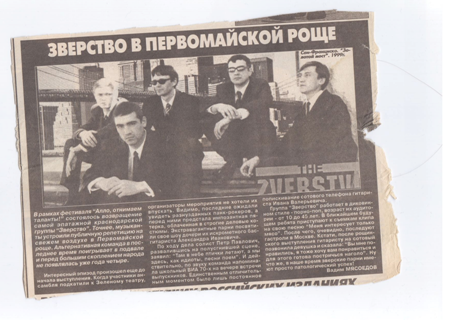 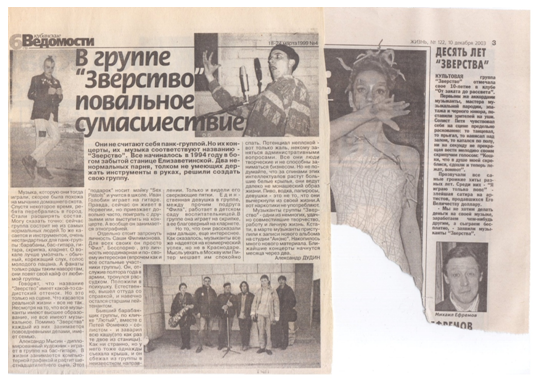 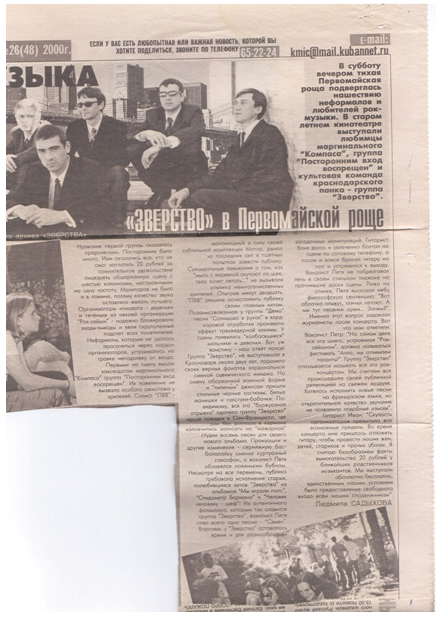
|
| Figure 3. Articles about the Zverstvo in Krasnodar newspapers. |
2.5To our great surprise we started to notice Zverstvo graffiti in gathering places of alternative youth, and even heard kids singing some of our songs on the street with a guitar.
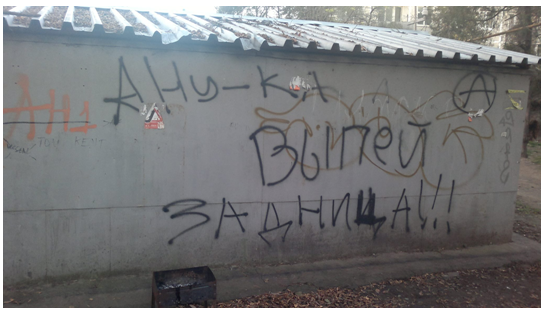
|
| Figure 4. A line from a Zverstvo song 'Hey you, asshole! Drink it!' originally recorded in 1996 sprayed around a garage wall in Krasnodar. Picture made in 2013 |
2.6Many of the local musicians I interviewed in 2009 admitted that the records we made in the 1990s and the phenomenon of Zverstvo as such was extremely important to them. It was a shocking and revealing experience to realise that it was possible to play such radical and non-conformist music here in such a provincial town as Krasnodar (Gololobov et al. 2014: 109).
2.7 In 1997, after my graduation I embarked on my MA at the Moscow School of Social and Economic Sciences. I had to leave Krasnodar, my band, and, as I thought, the scene, and although my course was only supposed to be for a year, it was the beginning of a long time away from home. Straight after my MA, I was granted an internship at the Norwegian Institute of Foreign Affairs, and then a postgraduate course at the Institute of Philosophy at the Russian Academy of Sciences and moved to Moscow again. In 2000, I was awarded a PhD scholarship in the UK. Since then, living mostly abroad and only visiting my hometown periodically, I did not take an active part in the life of the punk scene in Krasnodar. However, I kept close ties with my band. I organised their web-presence, international releases (Zverstvo 2005), played occasional gigs with them and kept on performing the role of manager, negotiating their releases and even gigs. I also kept close personal ties with the members of my band and the circle of friends formed around it. These links allowed me to still be considered a present rather than a former member of the band and of the local scene as a whole. In July 2012 I received surprising proof of this status when, after a benefit gig for Krymsk, severely hit by flooding that left more than 170 dead and thousands homeless, in which I performed with the Zverstvo on guitar, I was approached by a group of teenagers. They called me by my stage name and said that they followed the music experiments I have recorded abroad and that they are fans of my punk prose posted on LiveJournal.[3]
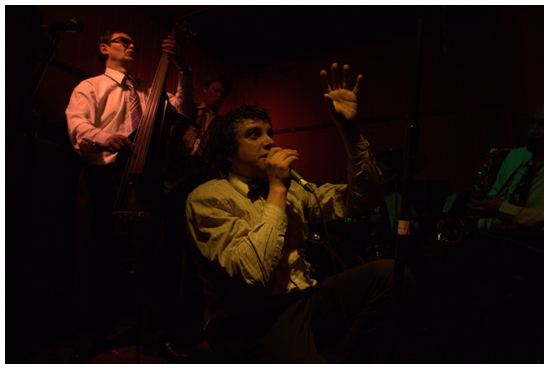
|
| Figure 5. Being a punk. The Zverstvo at Boston Arms Music Rooms, London, 5 May 2011.
|
3.1 My position as a member of the scene gave me a an almost unlimited access to nearly every corner of the local scene. I could interview anyone I wanted. I could visit any gig, take as many pictures and video recordings as I needed. I could copy much material as I wished. I was welcomed to closed events and was told private stories an outsider would never hear. However, this access, and in particular my position as a highly recognisable and influential member of the scene soon revealed the first problem with research made by a complete insider. This is the emotional and often physical impossibility of responding to the interest expressed by members of the scene. They saw me as a friend, treated me as a friend, and vice versa. I have known some of them for fifteen years or even more. However, in Russia, and particularly in Krasnodar, and especially in the local underground, these relations imply nearly unlimited availability to one another for fully informal contact, with substantial amounts of alcohol, cigarettes and sometimes other substances being consumed together. For the duration of the fieldwork these practices were intensified by the limited time I could spend in Krasnodar. Ever so often they wanted to see me much more than I could bear. At one point during my fieldwork, I could not critically reflect on my research as there was no time for me to withdraw from the field. Below is a paragraph from my diary which instances the exhaustion caused by the situation:
Entered the venue, already smoked through managed to grab the band for half an hour; that was cool because afterwards the club was filled with people. The guy I met before offered some ganja. For God's sake! Just a couple of days before I met a guy who spent 4 years in prison for this and talked to another one who had 4 convictions for the same shit … And everybody knows here that I don't smoke, why the hell offer! And who does he invite me to go for a joint with?! Igor - who is well known for attracting regular attention from the police; last time we met, on his way home he was stopped for a chat twice, and woke up with no money and a damaged knee.
What is this? Don't they know that I simply can't afford that kind of fun with a fancy camera on me?! Even for a document check. Idiots!
The band starts playing, more smoke in the air. Another guy whom I barely remember talks about doing some projects with his friends in the Ukraine who are kind of also interested in the music underground. For fuck's sake. Again. Nodding without listening to what he is saying. Finally, got rid of this one as well. Angry and even more tired. Don't think I managed to talk to the group in the interview. Pity, they were really cool, probably the most authentic punk band actually functioning in town.
Disappointment. And all for another sleepless night, can't fall asleep quickly after a smoked-through gig. Left the club at 1am and walked home through the empty city centre, watching how a police officer is negotiating something with a guy in a leather jacket, just like me, and two groups of posh youths picking a fight with each other 100 meters further, near a restaurant. Turning into the dark street. Want to hide. Put my earphones in. It's getting a bit too much. There is certainly something good about office sociology (Diary, Krasnodar, 11 November 2009).
3.2 This extract illustrates the first problem with conducting research in 'your own tribe' and how complete access to the researched community given to a full insider can be a double-edged sword: it not only allows you to communicate freely with anyone you want, but also implies reciprocal openness from the researcher. Under normal circumstances this might easily be managed. However, in the field a researcher often simply has no time for any far-reaching solutions and needs to consider a possibly excessive response to his or her presence as a friend and manage this problem accordingly in the course of a temporally limited fieldwork.
3.3 The second issue arising from the position of a complete insider is of a different order. It relates to interviewing and the narratives produced in the field by people to whom the interviewer is a friend more than a researcher.
Question from the audience: What does it feel like to be the object of research? I was wondering how the process of being involved in research is different from, let's say, answering the questions of a journalist? How do you do it differently? What does it feel like?
Petia: I had no idea that I was being researched by a researcher. Vania is an old friend of mine, so obviously, there were no … problems, it is like this.
(Rottenbeat: Academic and Musical Dialogue with new Russian Punk Workshop, London, 4 May 2011)
4.1 Generally speaking, there were not many problems with conducting research as an insider. However, during the research process rapport became a challenge. Interestingly, the issue of rapport as a particular challenge for 'insider' research has been discussed in previous publications. Taylor (2011: 15), for example, mentions that in her research of a queer community in Brisbane her closest friends sometimes tended to be 'over-supportive' to her research and provided 'excessive' accounts which she was unable to utilise in her academic analysis for ethical reasons. I was faced with a different problem. My friends-informants were not only excessive in their accounts, but also, and perhaps more often – rather minimalistic, referring me to the shared experience and memories. I will illustrate this problem with an extract from my conversation with Alex, an old friend and a former drummer of the Zverstvo.
Alex: Well, I started to play … somewhere around … when I was in the fifth or sixth year, my father, RIP, Alexander Stepanovich, you remember him, right?
Interviewer: Sure, sure!
Alex: Yes, you know him…
Interviewer: Yeah, in Moscow we…
Alex: Yes, yes. Exactly… So he showed me how to play guitar, showed me the chords, how to take these chords, and the first song I learned was 'The House of Rising Sun'… by the Animals. […]
Alex: I played drums till 1993, not bad, and then I played in the USA as well [in 1992-1993 Alex was sent to the USA as an exchange student] in the school orchestra, and in the church there I also played drums. So I entered the Zverstvo in 1994 and there it started. You know the following story of the Zverstvo […] by yourself.
(Alex, Interview, Krasnodar, 20 August 2009)
4.2 This extract demonstrates that for Alex, as for many other informants, it was difficult if not impossible to speak of the shared experience. They felt uneasy talking about the things which, as they suppose, I knew better than them: 'you know the following story by yourself'.
4.3 Analysing transcripts of the interviews recorded with my close friends I realised that most of them tend to miss the stories which I was a part of back then, about which I myself have firsthand experience and expertise. Moreover, the refusal to talk about topics on which we are presumed to share common knowledge manifested itself in rather straightforward gestures. Thus, in a conversation with Roma, a local music journalist and producer, which began as an informal chat but quickly turned into an interesting debate about the role of our band in the scene, I put a voice recorder on the table. This act was met by Sasha, the bass player of the Zverstvo, with a clear verdict: 'Vania [diminutive from Ivan], this fucking shit [points at the voice recorder] should be smashed against your head' (Sasha, conversation, Krasnodar, 1 October 2009). Obviously, such a thing would not have been said to an outsider and, despite the unseemly language, it demonstrates close ties between my informant and I.
4.4 Trust, established by years of friendship, sees informants readily pass knowledgeable information to me as a full and authoritative member of the researched scene. Thus, for instance, on a workshop called 'RottenBeat: Academic and Musical Dialogue with New Russian Punk' held in London in 2011, while discussing the point of view of musicians about being researched – and, moreover, being researched by me, their friend – Sasha said: 'Vania knows everything! Absolutely everything!' and Petia added, commenting on the question of what he would and would not like to see written by me about him: 'Well, if he writes something, it means he has to write it so. I will not be offended if this isn't something particularly pleasant about me' (Rottenbeat: Academic and Musical Dialogue with new Russian unk Workshop, London, 4 May 2011). These moments demonstrate that in an environment of close friendship, informants easily 'reverse' the popular postmodern and feminist trend of empowerment (Richardson 1990, Spivak 1988, Stacey 1991,Oakley 1981). They tend to pass knowledgeable authority to the researcher and often withdraw their own opinion or serious voice in respect of my research agenda ('write whatever you want if it is going to help you') or simply 'play' as a proof and enactment of trust and friendship coming from their side.
5.1 The paper demonstrates that a position as a member of the researched community, despite its obvious advantages, may create significant problems for the researcher. First of all, there is a problem of over-emphatic attitudes to his or her desire to know, see, experience and live through the moments important to the scene. Secondly, there is a certain 'dodging' register of speech, or even a refusal to express a voice, taken by close friends in conversations on the themes and experiences shared by interviewer and interviewed. It is difficult to think of a universal solution to the first problem since bonds, relations and networks of friendship are highly personal and therefore unique and unrepeatable. This means that every researcher going back to study his or her 'tribe' must come up with individual methods. The only obvious thing to say here is that the solutions to such epistemological problems would involve an ethical dimension, as a researcher will have to rethink and probably rearrange his or her relations with either the society and culture to which they are a complete insider or the research community to which they belong professionally. The second issue with doing research among your own community, however, can be approached methodologically. It is not the task of this article to engage in an extensive debate about the value of different registers and strategies of speech in deconstructing discourses. Nevertheless, I suggest that it is still possible to change a situation where informants prefer to give up their voice for the sake of friendship. I argue that it possible to regain the voice of the interviewee without violating mutual understanding established between friends, through a temporary withdrawal of the researcher's 'insiderness' and any unnatural articulation of his or her research identity.
5.2 I realised that when informants are keen on withdrawing their opinion and passing to me knowledgeable authority rather than speaking the shared memory and experience out, one-to-one interviews are probably not the best method of producing fieldwork material. Looking for a way to record the voices of my friends, I came up with the strategy of withdrawing my power of asking and delegating it to a third party who had no close ties to my friends. Thus, in 2009 I helped arrange a televised interview with Petia and Sasha, the creative core of the band. During the interview itself I sat next to them as a member of the band and answered the questions of the journalist in the same manner as my friends. As a result, both Petia and Sasha gave their opinions in a more distant way, addressing their replies in the third person, not second, as they usually did with me. They were able to speak and explain things about 'us' where I no longer bore the researcher's otherness and was not the one to whom this explanation was given:
Petia: Some people call our group jazz-punk. But punk implies a certain political position. We don't have it. As for jazz, we don't have enough music skill. We play the way we can. Today we have a saxophonist. If something happens to him, we will have… a pianist. (ABC 2009)
5.3 Taking this experience into account, we decided to bring the bands with whom we were working, including the Zverstvo, to London for an identical experiment where they were not only placed in front of the people they knew, but also had to face questions from other scholars, journalists and the general public, interested in the contemporary Russian music underground (Rottenbeat: Academic and Musical Dialogue with New Russian Punk Workshop, London, 4 May 2011,Kan 2011). Petia and Sasha, as the creative core of the band, were taking questions from the audience and I was performing a role of a neutral translator. Again, in this communicative disposition my friends did not feel the effect of a close relationship with the interviewer and were able to come out with interesting generalisations which would hardly have been possible with me 'on the other side' of the voice recorder. An interview excerpt from Petia and the way he spoke about the local scene is an example of such a response:
I would like to say that in our region, and we are from the South of Russia, such a concept as punk-music is impossible in principle. Why? Not because of the absence of punks, for example. The thing is, that those belonging to the punk culture cannot and do not want to make music. So, the main position of punk is to do nothing. We have no, unlike in the West, a notion such as a working class. It is absent. The political component is absent as well. In other words, there are no politics of fighting capitalism, because there is no capitalism as such. And in general, to make music, it is not important who you are against, whom you support, etc. This, in principle, is not something we would like to do. We've got enough of this. It is not cool.
It is more likely that with our music we stand against mental capitalism, against the cult of money, one's own wellbeing, utilitarian things. For the last ten years our stage image consists of white shirts, suits: this is an image of a successful person, yes? But with our music and performance we, following Brodsky, want to bring evil to the state of absurd. (Rottenbeat: Academic and Musical Dialogue with New Russian Punk Workshop, London, 4 May 2011)
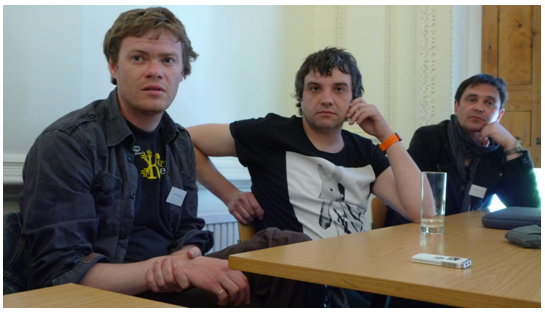
|
| Figure 6. Being a punk and a scholar. The Zverstvo at the RottenBeat workshop. From left to right: the author, Petia, Sasha. London, 4 May 2011
|
5.4 It is clear that the style of response, its extended character, and references to the concepts of 'capitalism', 'working class', 'the political component' are only possible in conversation with someone who does not belong to the community of 'us'. I personally cannot remember a situation where this kind of explanation came out in a dialogue between us as close friends and I can hardly think of a situation where Petia would speak to me in the same way, even if I asked him. These experiments show that, paradoxically enough, in some situations where a researcher has to produce textual data in a conversation or interview with his or her close friends, and where the researcher's identity is seriously 'undermined' by the bonds of friendship, it may be more productive not to reinforce one's position of an 'ethnographer', but to withdraw it completely and delegate 'asking authority' to a third party, keeping for oneself a purely technical role which does not cause any conflicts between either of the identities attached to a complete insider in the field.
5.5 This situation, however, identifies a further issue that a researcher working within a community of close friends must be aware of. Passing knowledgeable authority to friends, informants do not and cannot check or verify the ethnographic account of their lives because this violates trust. However, this same trust puts the question of a researcher's responsibility in a different light, which can be illustrated by the reaction of one of my key informants to a piece containing ethnographic material which was published in the UK.
5.6 In 2012 I wrote a short text called Derailed: A Story of One Photograph, which was published in the catalogue of an exhibition of young Russian artists in London and where I described a few episodes from the life of the scene (Gololobov 2012a). The article was supplemented with pictures taken at an open-air event in 1995. As I was talking about the people who appeared there, I marked the pictures with real names and nicknames, at least those I knew, and said a couple of words on what happened to these people afterwards, including a sentence about me: 'Vanya. Appallingly dressed guy with a longish blond hair. Got his PhD from the University of Essex, lives in the UK, and works at the University of Warwick' (Gololobov 2012: 26).
5.7 When I showed this article to Petia, who was in two of the four pictures printed there, he silently looked through then looked over the back cover, where all the authors and contributors were listed. He suddenly burst into laughter. My name was followed by Pussy Riot, a Russian feminist punk band whose members were at that time in prison awaiting trial for their performance 'Punk-Prayer'. Petia said: 'Here you are Vania! You thought you could disguise yourself as an academic. Now everybody can see your true identity as a… politically unreliable person'. Whether he was being ironic or something else is a good question, but it is not that important for this research. What struck me is that in passing knowledgeable authority to me, Petia also passed an ethical vulnerability. He recognised that there are consequences for what I as a researcher write and that I should somehow be, and de facto, am responsible for my texts. However – and here I can impute this view to other friends who took part in my research – this responsibility is not seen as answerability to them, but as the responsibility of someone who is one of them: my friends appeared to be more concerned about the effect my writings would have on me than on them. This might be particular to my field and may not be replicated in other research situations. And yet, without realising it, through their remarks my informants challenged the identities of insider and outsider, and in their own way articulated an important question of whether that dichotomy is relevant in an ethnographic study of one's own culture; especially if that culture is so visible in its bonds of friendship, aesthetics and political stance.
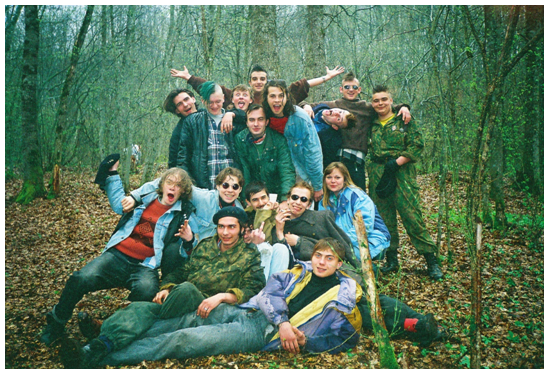
|
| Figure 7. Being with friends. The picture from the Derailed: A Story of One Photograph. Krasnodar punks at the regional Festival of Guitar Poetry, 1995.
|
On the top: With his hands stretched – Petia (now works as a manager of the Wolford boutique). Second raw, from left to right: Kill (now lives in Canada and works as a mining engineer); with a green Mohican – Alex (works as a technician at the Krasnodar Art Museum); showing his tongue – Kosmonavt (never heard from him since then); the guy in green jacket – Sab (works as a builder in Krasnodar); the guy with long dark hair - Voviaz (moved to Moscow); the guy in a blue shirt and black coat - Serioga 'Glaz' (soon after the picture was taken died from a heart attack after an overdose of Mandragora roots); in shades - Zhora Punk (died from an overdose in 2004); the guy in a camouflage - a Cossack (no one knew who he was, never heard of him since). Third raw, from left to right: appallingly dressed guy with a longish blond hair, in a blue jeans jacket – the author of this article; another guy in shades – Badun (later became a famous singer and performer, records albums and tours around Russia); barely seen, showing a middle finger - Scoffer (soon after that trip found himself in Krishna, died in a plane crush in 2006); the guy in a hackie coat – Arkasha (now works for United Nation refugee programme in Ethiopia); the guy in shades, trench-coat and with a cigarette – Shvabrin (lives in Krasnodar and works as an engineer); Sveta (works in a local Historical Museum). Lower raw, from left to right: the first guy from the left - I don't know him; Rykov (by now an artist or so).
1 It is not the aim of this research to discuss such terms as 'subcultures' (Hebdige 1979), 'post subcultures' (Muggleton & Weinzierl 2004), 'urban tribes' (Maffesoli 1996), 'neo tribes' (Bennett 1999), 'scenes', or 'communities of taste' (Thornton 1995) etc. applied to the phenomenon of specific urban youth and adult cultures centred around music and various forms of symbolic representation, which emerged in the after-War period in the West and by the end of the 20th century spread nearly all over the world. In this study the difference and limits of each concept are not important and the aforementioned terms are going to be used interchangeably.
2 In this research, I have chosen not to anonymise names of the musicians and scene activists with whom I worked unless desired by my informants. Adding to the concern expressed by Stein (2010) and Van Den Hoonaard (2003), I argue that in a situation where the real identities of people can easily be traced through either my own identity or the events mention, this 'outing' would be a gesture for which I personally find no credible explanation. Moreover, such 'anonymity' with regard to public figures, and especially musicians, whose real identities are readily apprehendable to a reader, has already proved a highly problematic approach (Cushman 1995) and is not particularly welcomed in 'punkademia' (Furness 2011).
3 http://ivanishevich.livejournal.com.
ABC (2009), Siuzhet o gruppe 'Zverstvo'. TV-proekt 'Sobytia Kul'tury'. Retrieved from http://www.youtube.com/watch?v=2wgD9dhGygg.
BENNET, A. (1999). Subcultures or Neo-Tribes? Rethinking the Relationship between Youth, Style and Musical Taste. Sociology, 3, p.599-617.
CLIFFORD, J. (1983). On Ethnographic Authority. Representations, 2, p.118-146. [doi://dx.doi.org/10.2307/2928386]
COHEN, S. (1993). Ethnography and Popular Music Studies. Popular Music, 2, p.123-137. [doi://dx.doi.org/10.1017/S0261143000005511]
CUSHMAN, T. (1995). Notes from Underground. Rock Music Counterculture in Russia. New York, NY: SUNY press.
DAVIES, C. (1999). Reflexive Ethnography. A guide to researching selves and others. London, UK: Routledge.
DENZIN, N. (1989). Interpretive Interactionism. London, UK: SAGE.
FURNESS, Z (ed. 2012). Punkademics. The basement show in the ivory tower. New York, NY: Minor Compositions.
GOLOLOBOV, I. (2012a). Derailed. A Story of One Photograph. A Joyful Archipelago. A Collection of Voices that in Various Ways Reflect on the Events in Present-Day Russia (p. 20-29). London, UK: Outset.
GOLOLOBOV, I., PILKINGTON, H. & STEINHOLT Y. (2014). Punk in Russia. Cultural Mutation from the "Useless" to the "Moronic". London: Routledge.
GUILLEMIN, M. & GILLAM, L. (2004), Ethics, Reflexivity, and 'Ethically Important Moments' in Research. Qualitative Inquiry, 2, p.261-280. [doi://dx.doi.org/10.1177/1077800403262360]
HAENFLER, R. (2006). Straight Edge: Clean-Living Youth, Hardcore Punk, and Social Change. New Brunswick: Rutgers University Press.
HEBDIGE, D. (1979). Subculture: The Meaning of Style. New York, US: Methuen.
HODKINSON, P. (2002). Goth: Identity, Style and Subculture. Oxford, UK: Berg. [doi://dx.doi.org/10.2752/9781847888747]
HODKINSON, P. (2005). 'Insider Research' in the Study of Youth Cultures. Journal of Youth Studies, 2, p.131-149. [doi://dx.doi.org/10.1080/13676260500149238]
KAN, A. (2011). Rokovedenie? Est' takaia nauka!, BBC Russian Service. Retrieved from http://www.bbc.co.uk/russian/society/2011/05/110519_rock_music_science.shtml
LEBLANC, L. (1999). Pretty in Punk: Girls' Gender Resistance in a Boys' Subculture. New Brunswick: Rutgers University Press.
MACDONALD, N. (2001). The Graffiti Subculture: Youth, Masculinity, and Identity in London and New York. New York, US: Palgrave Macmillian. [doi://dx.doi.org/10.1057/9780230511743]
MAFFESOLI, M. (1996). The Time of the Tribes: The Decline of Individualism in Mass Society. London, UK: SAGE.
MOORE, R. (2010). Sells Like Teen Spirit: Music, Youth Culture, and Social Crisis. New York, US: NYU press.
MOROZOV, I (1995). 'Retsenziia na al'bom 1994 g. 'Ty mne nravish'sia, kto tebia razdelyval?' in a min'ony togo zhe goda', DEMO TAPE. Zheleznyi marsh, p.13.
MUGGLETON, D. & WEINZIERL, R. (2004). The Post-Subcultures Reader. Oxford, UK: Berg.
MUGGLETON, D. (2002). Inside Subculture: The Postmodern Meaning of Style. Oxford, UK: Berg.
O'CONNOR, A. (2008). Punk Record Labels and the Struggle for Autonomy: The Emergence of DIY. Lanham, MD: Lexington Books.
OAKLEY, A. (1981). Interviewing Women: A Contradiction in Terms. (Roberts, H. ed.) Doing Feminist Research. London: Routledge and Kegan Paul. p. 30-61
RICHARDSON, L. (1990). Narrative and sociology. Journal of Contemporary Ethnography, 9, p.116-136. [doi://dx.doi.org/10.1177/089124190019001006]
ROTTENBEAT: Academic and Musical Dialogue with New Russian Punk Workshop, London, 4 May 2011, organised by the University of Warwick with support of the Pushkin House: Centre of Russian Culture in London, AHRC and CEELBAS. http://www2.warwick.ac.uk/fac/soc/sociology/rsw/current/punk/output/confsandworkshops/rbworkshop/ (Accessed 20 June 2012).
SPIVAK, G. (1988). Can the Subaltern Speak? (Nelson, C. & L. Grossberg eds.) Marxism and the Interpretation of Culture. Basingstoke: Macmillian. p.271-313.
STACEY, J. (1991). Can There Be a Feminist Ethnography? (Gluck, S. & Patai, D. eds.) Women's Words: The Feminist Practice of Oral History. London, UK: Routledge. p.111-19
STEIN, A. (2010). Sex, Truths, and Audiotape: Anonymity and the Ethics of Exposure in Public Ethnography. Journal of Contemporary Ethnography, 39, p.554-68. [doi://dx.doi.org/10.1177/0891241610375955]
THE BOSTON GLOBE (2011). The Rise of Punkademia. How do you study a movement that doesn't want to be studied?, The Boston Globe, 05 November 2011.
TAYLOR, J. (2011). The Intimate Insider: Negotiating the Ethics of Friendship When Doing Insider Research. Qualitative Research, 1, p.3-22. [doi://dx.doi.org/10.1177/1468794110384447]
THORNTON, S. (1995). Club Cultures: Music, Media, and Subcultural Capital. Cambridge, UK: Polity Press.
VAN DEN HOONAARD, W. C. (2003). Is Anonymity an Artifact in Ethnographic Research? Journal of Academic Ethics , 2, p.141-151.
ZVERSTVO (1994), 'Ty mne nravish'sia! Kto tebia razdelyval!/I like you! Whom you were dismembered by?', DIY, Krasnodar, Russia.
ZVERSTVO (1995) 'Ia igraiu tol'ko pops!/I play only pops!', tape, Begemot Records, Krasnodar, Russia.
ZVERSTVO (1996), 'Spidometer Bormana', tape, Begemot Records, Krasnodar, Russia.
ZVERSTVO , The (2005), 'Can't Eat This Record', net release, Analog und Ehrlich, aue0502, release date: 2005-03-17.